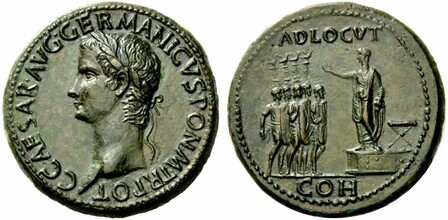Grundständige Studiengänge
Master-Studiengänge
Weitere Studienmöglichkeiten
- Aufbaustudiengänge
- Wissenschaftliche Weiterbildung
- Gasthörer*innen
- Angebote der Goethe Business School
- Graduiertenakademie
- Universität des 3. Lebensalters
Archäologie von Münze, Geld und von Wirtschaft in der Antike (Master of Arts)
(Archaeology of coinage, money and the economy in the ancient world)

 |
Overview
Conditions of admission
Applications
Overview
|
Course content and focus areas |
The MA-program ‘Archaeology of coinage, money and the economy in the ancient world’ concentrates on two important institutions that came to play a decisive role in the Graeco-Roman world and its border zones, and whose available technical and analytical possibilities have a very high knowledge potential. The economy is understood as the sum of the goods and services which were created in answer to the needs of people, affecting the basis of life and co-existence in every community. Within this money was embedded. This could take the form of a great variety of goods, which functioned as a standard of value, a medium of exchange, a medium of payment and a medium which could be hoarded. The time period of the programme is bounded by the adoption of coinage in c. 600 BC and the end of the western Roman Empire shortly before AD 500. The sources examined in the programme are archaeological features and material culture like coins, ceramics, and objects of metal and stone, as well as literary evidence. This takes the form of the textual corpus of ancient authors, inscriptions on stone and bronze, as well as cursive inscriptions on various materials. Important are the broader societal structures and state institutions of the ancient world, as well as its mentalities, technical potential, and infrastructure. Also important is data that points to the conditions of the natural landscape, the findings of modern archaeometric analyses, as well as contributions from archaeobotany and archaeozoology. From this basis, the economy and the use and functions of money and coinage will be traced as comprehensively as possible within the above mentioned geographical region and time period. A degree in ‘Archaeology of coinage, money and the economy in the ancient world’ provides students with the ability to deal with the existing sources in an independent, theoretically grounded and methodologically appropriate manner, and to critically assess and classify individual source genres. Remarkable about this programme is the combination of archaeology, economic archaeology, economic history, numismatics, the history of money, and archaeometry, all of which are focused on state and society in antiquity. The goals of the MA-program are 1) to solidify and enlarge the knowledge of the archaeology of coins, money and the economy in the ancient world acquired during the BA-program, 2) to further develop the skills of independent and critical thinking and reasoning 3) to train time-management and efficient organisation of research. |
|
Detailed information |
Information on the department |
|
Degree |
Master of Arts in Archaeology of coinage, money and the economy in the ancient world |
|
Duration |
Die Regelstudienzeit beträgt i.d.R. für externe Studierende vier (Variante A), für Frankfurter Studierende aufgrund der um zwei Semester längeren BA-Studiengangs nur zwei Semester (Variante B). |
|
Languages of instruction |
German |
|
Start of the programme |
The study programme starts at the beginning of the winter- or summer semester. |
|
Student advisory service |
Prof. Dr. Fleur Kemmers |
Conditions of admission
|
Admission requirements |
a) der Nachweis eines Bachelorabschlusses in Archäologie von Münze, Geld und von Wirtschaft in der Antike (im Hauptfach oder im Nebenfach) oder in Archäologischen Wissenschaften mit dem entsprechenden Schwerpunkt oder in einem Bachelorstudiengang in der gleichen Fachrichtung jeweils mit einer Regelstudienzeit von acht Semestern oder b) der Nachweis eines Bachelorabschlusses in Archäologie von Münze, Geld und von Wirtschaft in der Antike oder in verwandter Fachrichtung (z. B. in Klassischer Archäologie, Alter Geschichte, Provinzialrömischer Archäologie) mit einer Regelstudienzeit von sechs Semestern oder c) der Nachweis eines mindestens gleichwertigen Abschlusses einer deutschen Universität oder einer deutschen Fachhochschule in verwandter Fachrichtung mit einer Regelstudienzeit von mindestens sechs Semestern oder d) der Nachweis eines mindestens gleichwertigen ausländischen Abschlusses in gleicher oder verwandter Fachrichtung mit einer Regelstudienzeit von mindestens sechs Semestern. In den Fällen von b), c) und d) ist die Master-Variante A mit insgesamt vier Semestern zu studieren.
|
|
Provisional admission |
Eine vorläufige Zulassung ist unter Vorbehalt möglich, wenn mindestens 80% der für den Bachelorabschluss erforderlichen CP erreicht wurden und die Bachelorarbeit bereits abgeschlossen ist oder kurz vor dem Abschluss steht. Der Bewerbung sind ein Nachweis der gegenwärtigen Immatrikulation im Bachelorstudium sowie eine Empfehlung der Betreuerin oder des Betreuers der Bachelorarbeit beizufügen. Der Bachelorabschluss muss spätestens innerhalb der nächsten 6 Monate nachgewiesen werden. Über die vorläufige Zulassung entscheidet der Prüfungsausschuss. |
|
Mode of admission |
Admission is not restricted. Students will be directly admitted if the admission requirements are met in full. |
Applications
|
Documents to be submitted |
|
|
Application period |
01.06. - 31.08. for the winter semester |
|
Address for applications |



